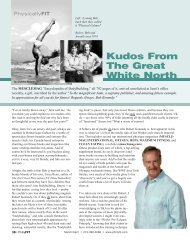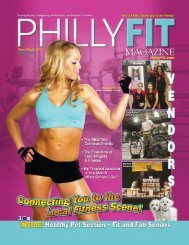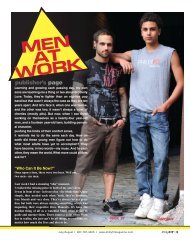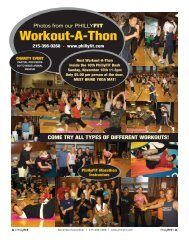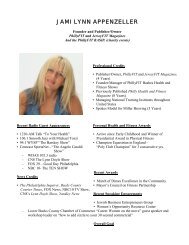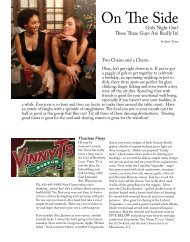cover 0708.qxd - PhillyFIT Magazine
cover 0708.qxd - PhillyFIT Magazine
cover 0708.qxd - PhillyFIT Magazine
You also want an ePaper? Increase the reach of your titles
YUMPU automatically turns print PDFs into web optimized ePapers that Google loves.
PhysicallyFIT<br />
Writing to Heal:<br />
A Personal Journey<br />
by Linda C. Wisniewski<br />
Take a walk through any bookstore, and you’ll see that memoirs are among the most popular<br />
books being sold today. People from all walks of life are putting their stories together<br />
for their families, friends and for publication. They write for self-expression, to share their<br />
struggles and triumphs, and to leave a record for their children. We love to read real-life<br />
inspirational stories. But did you know there are very tangible health benefits to writing<br />
In the 1990s, Dr. James Pennebaker, a professor of psychology at the University of Texas at Austin, did some research on the effects<br />
of writing. He found that people who wrote about emotionally traumatic events exhibited reductions in blood pressure and heart rate<br />
and improvement in conditions like asthma and rheumatoid arthritis.<br />
You may have experienced these benefits yourself after writing in a diary or journal. And if<br />
you’ve shared a personal story with a friend, you probably know the comfort of a sympathetic<br />
ear. But even if you write only for yourself, putting your feelings down on paper<br />
can change your life. There is something about putting pen to paper (or fingers to keyboard)<br />
that places a traumatic event in perspective. We begin to see its place in the<br />
larger story of life. We reflect on its meaning. And we find, after a time of writing<br />
and reflection, that the event no longer has power over us. We no longer feel the<br />
old pain when remembering.<br />
When I began to write about my own painful memories, my tears fell on the page.<br />
But soon, the act of revising and creating a story from these memories became my<br />
life’s purpose. Writing about the emotional abuse my mother, sister and I suffered<br />
at home brought a new understanding of the power of words to both hurt and heal.<br />
My father’s words beat us down, but the story I’ve written about our life together<br />
gave me empathy for other survivors. I was finally able to understand my mother’s<br />
passivity and why other women don’t immediately leave abusive partners. I saw,<br />
through writing, that often I was like her, passive and silent. Forgiving myself, and her,<br />
I found my own voice.<br />
Over the years, I’ve found that memoir writing has taken the sting out of my most painful<br />
memories. The tears that once dampened my pages have dried. When I read my stories<br />
aloud to an audience, I sometimes feel a moment of sadness for my<br />
past. It’s a long way from the raw pain that once had me in its grip.<br />
The journey to healing emotional wounds through writing is one we<br />
can all travel. All you need is something to write with, a comfortable<br />
space, and the time and willingness to look within.<br />
I’d like my experiences writing and teaching memoirs to help you gather<br />
your personal stories, and when you are ready, heal your body and heart.<br />
To get you started, here are a few things I’ve learned along the way:<br />
Continued on page 36<br />
34 I <strong>PhillyFIT</strong><br />
March/April I 215-396-0268 I www.phillyfitmagazine.com




